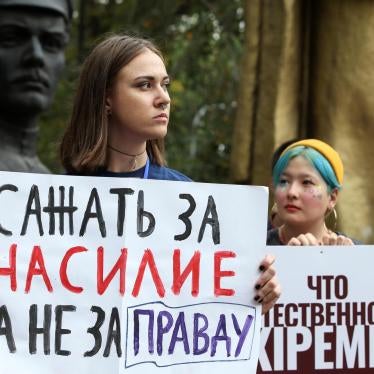Every year on March 8, Kazakhstan’s leaders commemorate International Women’s Day – a national holiday – in speeches praising women for their professional competitiveness and achievements, beauty, and “love for family values and traditions.” What they don’t mention is the fact that women – who make up over half the population – in modern Kazakhstan also remain easy targets for domestic violence. Today Kazakhstan’s women need more than just praise and admiration.
Kazakhstan’s government has taken important steps to address domestic violence in the last decade. It has adopted a law on prevention of domestic violence, increased the number of state-funded crisis centers and adopted the “Standards of Provision of Special Social Services to the Victims of Domestic Violence.” But these measures are inadequate and domestic violence remains a sustained and serious threat for women in Kazakhstan. And it is not treated as a stand-alone crime under Kazakhstan’s laws.
Two killings of women in Kazakhstan in January alone shocked the public. Twenty-nine-year-old Aisulu Shotkina was beaten to death by her husband in front of her children and mother in northern Kazakhstan. She died before emergency services arrived. Another domestic violence victim died the day after she was hospitalized in Uralsk, in western Kazakhstan. In both cases criminal investigations have been opened into the offence of intentional infliction of grievous bodily harm, resulting in death. The accused face up to 12 years in prison.
The violence that caused Aisulu Shotkina’s death was not an isolated incident. Relatives told journalists that her husband “beat her all the time, even when she was pregnant” and that she had been afraid to file for a divorce. As with most domestic violence killings, her death followed a longstanding pattern of control and violence by her abuser. This is why early and appropriate intervention and access to critical services – such as shelters – are essential.
Her murder mirrors many stories of horrific violence I heard when interviewing women for the Human Rights Watch 2019 report on domestic violence in Kazakhstan. Women profiled in the report were lucky enough to find refuge and social protection in the country’s few crisis centers. They survived and voiced their stories. Aisulu Shotkina did not have that chance.
The women’s stories exposed serious gaps in the authorities’ response to domestic violence, including inadequate enforcement of existing legislation, and a failure to hold abusers accountable and ensure access to justice for survivors.
Public outcry against insufficient action on domestic violence intensified in December when lawmakers passed a series of amendments to Kazakhstan’s administrative code. They reduced the minimum punishment for domestic abusers accused of “battery” and “intentional infliction of light bodily harm” from a fine to a warning. The same crimes committed by a stranger result in, at minimum, a fine.
Kazakh officials defended the change, saying that fines were eliminated because they are often paid from the family budget, effectively punishing the whole family – a concern echoed by women’s rights activists interviewed by Human Rights Watch. Officials also note that the warning is only a minimum measure and that repeated instance of battery or infliction of light bodily harm within a year are punishable by arrest and detention of up to 20 days. And systematic beatings can now be prosecuted as criminal offenses under the legal category of “torment”.
In addition, the Justice Ministry told us in January that all cases of battery and infliction of light bodily harm will be addressed exclusively through the courts. In the past, the police could terminate the proceedings at any stage, including in cases of reconciliation.
It is still too early to assess whether these recent amendments to the administrative code will prove to be more effective in practice. But domestic abuse should never be punishable with only a warning and stronger measures should urgently be taken to protect women from family violence.
Kazakh officials should robustly condemn domestic violence and treat it as a stand-alone crime. Survivors should not be ashamed of being abused, and the shame should be placed on the abusers.
March 8 should not only mark women’s social and political successes. It is also a day to call on governments to act to stop violence against women. Kazakhstan’s officials and society should see to it that stories like Aisulu Shotkina’s will become a thing of the past.
Vika Kim is an assistant researcher at Human Rights Watch.








